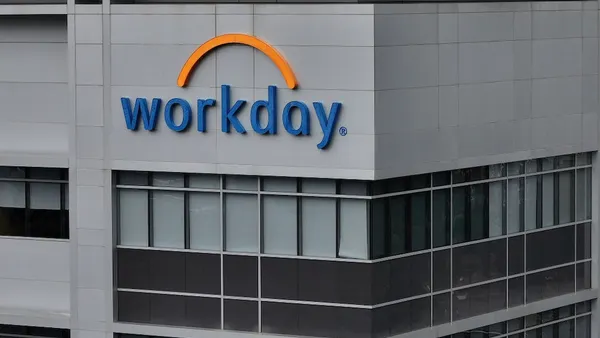In "Other Duties as Assigned," HR Dive's senior editor, Kate Tornone, weighs in on employment trends, compliance best practices and, of course, the situations that require you to go above and beyond your normal duties. Today: being thoughtful about how you address workforce problems.
Pop quiz: You've got a workforce problem and you're pretty upset about it. Do you (a) take a hard, honest look at your engagement efforts; or (b) go on a tirade in a media interview, calling into question your workers' morals, upbringing and background.
You're an avid HR Dive reader so you know the answer is "a." But sadly, that decision proved difficult for Holtec International's president and CEO. In an interview with a New Jersey business publication, he lamented the company's recent decision to open a facility in Camden, a city that has struggled to attract desperately needed businesses.
In a rant that stakeholders said was, at best, lacking in awareness — and, at worst, steeped in racism — he said Holtec can't seem to find and retain workers and pointed to a sense of entitlement and a lack of training.
"People don't have the skills," he said, adding that there's also "no tradition of work in families." But wait, it gets worse.
"They don't show up to work," he continued. "They can't stand getting up in the morning and coming to work every single day. They haven't done it, and they didn't see their parents do it. Of course, some of them get into drugs and things. So, it's difficult."
The comments drew outrage from the city's mayor and community leaders. The problem? The city's residents largely identify as either "black or African American" or "Hispanic or Latino," according to 2017 census data. Residents often face numerous poverty-related woes — from food-desert status to record-high murder rates — that stem from pervasive, systemic discrimination. The city's mayor said in a press release that the comments amounted to "outrageous stereotyping." Another organization called them "racist and classist." And members of the community protested in front of the building.
WE ARE "THEY" #Iamcamden #Imamemployeable #CAMDENSTRONG pic.twitter.com/HmBgUJMzlD
— BigJoe (@BIGNOIZEINCCMD) September 14, 2018
Holtec's CEO has previously said he doesn't care about race, publicly eschewing diversity and inclusion efforts. But I don't think that's an option here. Because research shows that so many of Camden's plights were caused by race discrimination, no one has the luxury of discussing workforce issues in the city — much less making sweeping generalizations about its residents — without also talking about race.
Is Holtec actually facing workforce problems like skills gaps, poor engagement and drug abuse? If the rest of the manufacturing industry is any indication, sure. And did its CEO mention a plan to undertake training and other efforts? Absolutely. But looking back at the comments, there's a pretty gross number of "theys" and "thems." Word choices like this have long been code for racism — they do a really good job of other-ing someone you can't identify with. And attributing workforce problems to an ugly stereotype is a bad idea. This is not how leaders should be talking about employees. Holtec's CEO has since responded to the criticism, saying that his words were taken out of context, adding "I am sorry that my misconstrued comments may have offended/disrespected some people," — not exactly the damage control we've seen experts recommend.
Make a better choice
So back to our quiz. You've got some widespread employee problem; maybe you can't get most of your workforce to show up on time, or maybe you can't find enough applicants who can pass a drug test. You have two options: you can make it worse or you can fix it.
First, remember that language matters. Words like "we" go a long way. We met this quarter's goal. We can do better. Complaining and stereotyping only make things worse. If you talk about employees in terms of "they," any shred of engagement you had will disappear. Put yourself in a disengaged Holtec employee's shoes: Is this rant going to make you want to be a model employee now? What if you were already a model employee? Either way, you're going to jump ship the first chance you get.
But Holtec may not see a mass exodus of workers as a result of this incident. The lack of large employers in Camden may well mean that employees have to stay put, leaving the company with even less-engaged workers now.
Second, put in the work. As an employer, you need to pinpoint the problems you're facing and determine which solutions will work for your workforce. Your peers have plenty of ideas. If employees are just generally disengaged (which can certainly prompt unreliability), perhaps you can better demonstrate how individuals' work fits into the company's larger goals. If too few workers can pass a drug test, maybe it's time to rethink marijuana testing for positions where safety isn't an issue, and offer rehab for more serious situations. If applicants lack the skills you need — welcome to the skills gap — your answer is training: training for current employees, apprenticeships for next year's employees and partnerships with local schools for next decade's employees. If you can't find enough applicants at all — a problem so many in manufacturing are facing right now — look at how your competitors are rebranding and working to fix the industry's image problem.
And finally, remember that a little compassion goes a long way. Gone are the days of managing with a heavy hand. We now know that employees want empathy and that it can have an enormous impact on engagement. This starts with trying to see the whole person, and keeping in mind that "employee" is just one piece of an individual's identity.
If you can take these three steps — watch your language, put in the work and exercise empathy — you'll be in a really good position to address any problems you might be facing.
















